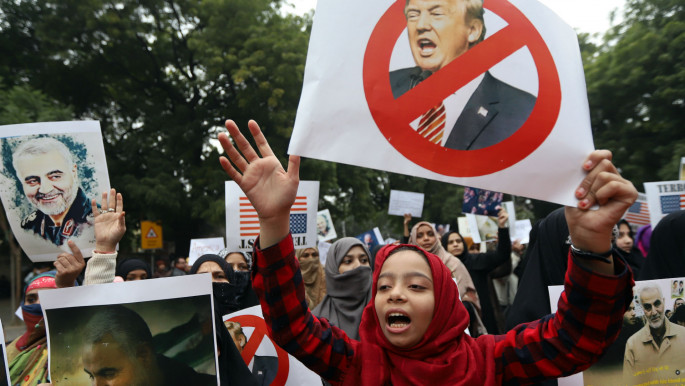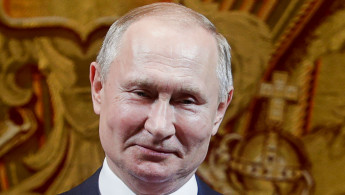Russia says Iran nuclear deal still 'global asset' despite hanging by a thread
Russia insists the Iran nuclear deal is still alive despite Iran's recent actions to the contrary.
3 min read
Russia insists the nuclear deal is intact [Getty]
Iran has abandoned almost all of its nuclear commitments as Europe urges the country to stick to its promise – but Russia insists that the deal remains intact.
Russia's foreign ministry said on Monday that it saw no threat of nuclear weapons proliferation following Iran's decision to abandon limitations on enriching uranium.
The ministry is urging the US and Europe - both of whom have expressed grave concerns over Iran's actions - "not to create additional tension and uncertainty".
Moscow is committed to the 2015 deal, which US President Donald Trump pulled out of despite being brokered by his predecessor. It said the deal "remains a global asset".
It went as far as to add that Iran's uranium enrichment "does not in itself pose any threat from the point of view of the proliferation of nuclear weapons".
Read More: The significance of Qasem Soleimani’s assassination
"[Iran] is carrying out all its activities in close cooperation and under the constant supervision" of the UN’s nuclear watchdog, the International Atomic Energy Agency, Moscow added.
Russian Defence Minister Sergei Shoigu contacted Iran's Chief of General Staff Mohammad Bagher, and though the details of the conversation remain private, the defence minister said they discussed ways to deescalate.
Russia's foreign ministry said on Monday that it saw no threat of nuclear weapons proliferation following Iran's decision to abandon limitations on enriching uranium.
The ministry is urging the US and Europe - both of whom have expressed grave concerns over Iran's actions - "not to create additional tension and uncertainty".
Moscow is committed to the 2015 deal, which US President Donald Trump pulled out of despite being brokered by his predecessor. It said the deal "remains a global asset".
It went as far as to add that Iran's uranium enrichment "does not in itself pose any threat from the point of view of the proliferation of nuclear weapons".
Read More: The significance of Qasem Soleimani’s assassination
"[Iran] is carrying out all its activities in close cooperation and under the constant supervision" of the UN’s nuclear watchdog, the International Atomic Energy Agency, Moscow added.
|
Russian Defence Minister Sergei Shoigu contacted Iran's Chief of General Staff Mohammad Bagher, and though the details of the conversation remain private, the defence minister said they discussed ways to deescalate.
Iran's nuclear commitments in tatters
The US killin of Iran's Qasem Soleimani has prompted Iran to abandon almost all of its nuclear commitments. On Sunday, it announced its fifth reduction in its nuclear commitments, saying it will forego the "limit on the number of centrifuges".
Iran's 2015 nuclear agreements with the United Nations Security Council's five permanent members - the UK, China, France, Russia and the United States - as well as Germany - has been nothing more than theatre since the US withdrew unilaterally two years ago.
Germany, France and the UK are attempting to hold it together, and on Sunday urged Iran to drop measures that go against the 2015 nuclear deal.
"We call on Iran to withdraw all measures that are not in line with the nuclear agreement," German Chancellor Angela Merkel, French President Emmanuel Macron and British PM Boris Johnson said in a joint statement.
They added: "It is crucial now to de-escalate. We call on all the players involved to show utmost restraint and responsibility."
The European leaders also pleaded with the parties to not jeopardise a battle against Islamic State group militants, after the Iraqi parliament passed a resolution demanding that thousands of US troops leave the country.
 |
| Anti-America protests are erupting all over the Middle East [Getty] |
"Preserving the (anti-IS) coalition is of great importance in this context. We call on the Iraqi authorities to continue to provide the coalition with the necessary support," they said.
Deepening rift
The relationship between Washington and Tehran, which has been rocky at best since Trump came into his presidency, has worsened.
Iran has promised a "severe" response to the airstrikes, which killed controversial military general Solaimani.
Trump has doubled down and warned that he isn't opposed to bombing cultural sites in Iran - something the UN considers to be a war crime - should there be a military reply from Iran.
Washington has reportedly been detaining passengers of Iranian descent as they re-enter the country.
US customs officials are reportedly detaining and questioning passengers of Iranian descent re-entering the country, according to Muslim rights organisation CAIR.
The US Customs & Border Protection (CBP) allegedly received a notice to report and detain all "suspicious" Iranians entering the country, irrespective of their immigration and citizenship status.
The move also targets American-Iranians who were born and raised in the US, a press released by CAIR stated.
At least 60 have already been detained since the press release was published on Sunday, all of which were questioned about their political views and allegiances at the Peace Arch Border crossing in Blaine.





 Follow the Middle East's top stories in English at The New Arab on Google News
Follow the Middle East's top stories in English at The New Arab on Google News


